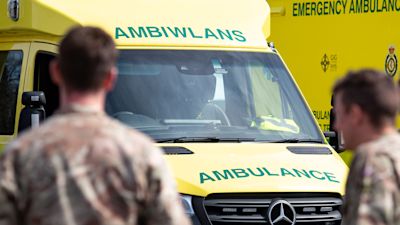Military ‘frustrated bystanders’ while helping ambulance staff in Wales

Military personnel, drafted in to help the ambulance service in Wales, have been left as frustrated bystanders, a union has said.
The GMB Union has said personnel deserve better than being sidelined on emergency calls, having only had a ‘two-day familiarisation course’.
More than 100 defence personnel were initially drafted in to work as non-emergency drivers in October, with the original intention being for them to provide assistance until the end of November.
The union is calling for additional training for military staff assisting the overburdened Wales Ambulance Service.
Instead of specialised training, personnel were given a two-day familiarisation course in October, which means when ambulances attend a call out, armed forces personnel are often unable to aid in response procedures, the union has said.
The union says it has been told stressed defence staff are taking sick leave after attending call outs.
GMB Organiser Nathan Holman said: "Frankly, our military personnel deserve better.
"This is a training issue, not a personnel issue – and they need the training to be able to assist effectively.
“Our military should not be left as frustrated bystanders, we should give them the tools to be as effective as they can be and that should be in the form of the correct training, not a two-day taster course."
The GMB Union represents workers from a range of professions and is currently highlighting concerns of WAST employees.
"We have to emphasise the point that we are not anti-military," Mr Holman said.
"The problem we have is that our members are telling us that having unqualified individuals coming in to support them has a detrimental effect on them, has a detrimental impact on the patients and is not the best thing for those individuals to be put in a position to do a role they are not qualified to do.
"These individuals should be given the skills to do that job.
"My members are coming to me on a daily basis saying they are volunteering to do overtime, but they are being told 'no, we are bringing the military in instead'.
"Clearly that is not the best option. If we have people who are willing to do it, they should be put forward first so the public have the best service for them."
Responding to GMB's assessment of the situation, Jason Killens, chief executive of the Welsh Ambulance Service said: “In mid-October we began working with 110 military personnel, bolstering our capacity to respond to those in need across Wales by 12%.
“The familiarisation training given with ambulance equipment and processes has been the same throughout the previous two periods of military involvement and it is this tried and tested programme we have rolled out to the current cohort.
“It is designed, not to replace the expertise of our paramedics and technicians, but to enable military personnel to assist them in the best way possible.
“A small number of our staff have raised concerns about working with military colleagues and we have met with Trade Unions on a number of occasions in recent weeks to work through these concerns and have made good progress.
“We are grateful for the support of the military and of our people in adjusting how they work to enable us to reach more patients quicker during this period of sustained and unprecedented pressure.”
A spokesperson for the Ministry of Defence told ITV Wales: “Service personnel are currently employed by the Welsh Ambulance Service Trust as non-emergency drivers.
"We are confident that the training package delivered to these drivers is adequate and appropriate for them to undertake their duties.”
The Welsh Government backed the ambulance service's plea for military aid in September, but declined to comment on the latest concerns raised.
Read more